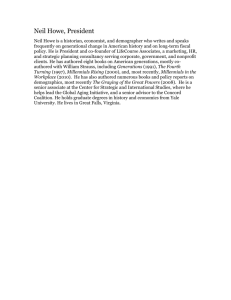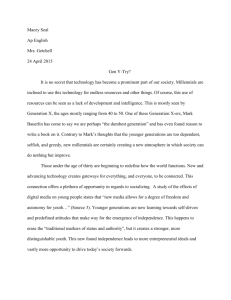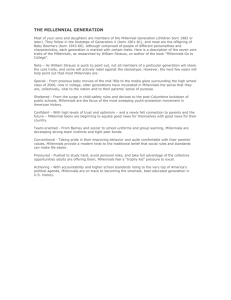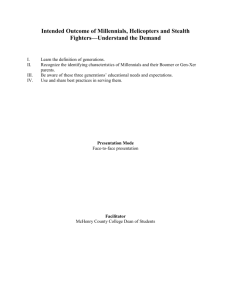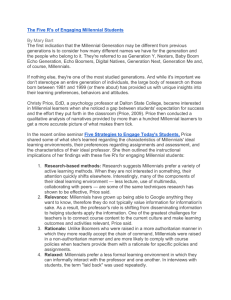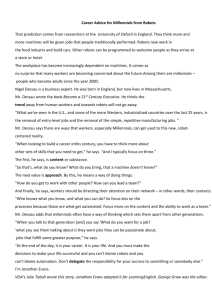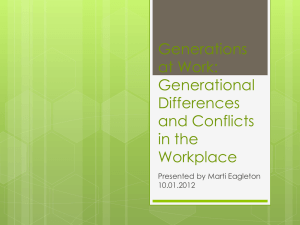Greek House Staff Communication
advertisement
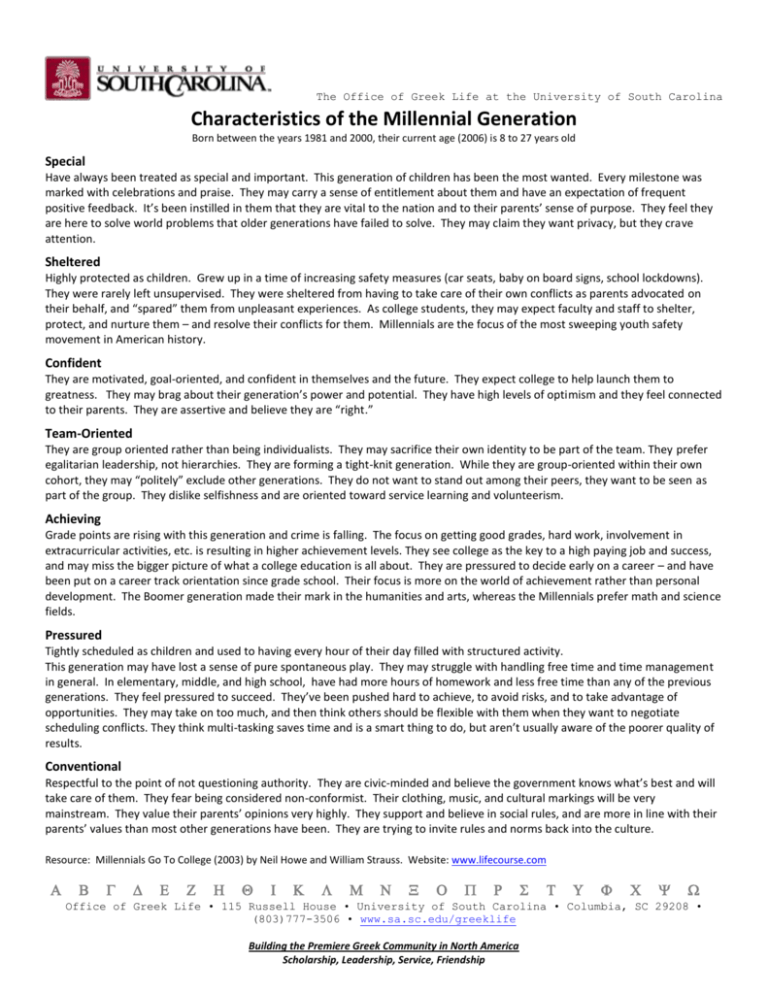
The Office of Greek Life at the University of South Carolina Characteristics of the Millennial Generation Born between the years 1981 and 2000, their current age (2006) is 8 to 27 years old Special Have always been treated as special and important. This generation of children has been the most wanted. Every milestone was marked with celebrations and praise. They may carry a sense of entitlement about them and have an expectation of frequent positive feedback. It’s been instilled in them that they are vital to the nation and to their parents’ sense of purpose. They feel they are here to solve world problems that older generations have failed to solve. They may claim they want privacy, but they crave attention. Sheltered Highly protected as children. Grew up in a time of increasing safety measures (car seats, baby on board signs, school lockdowns). They were rarely left unsupervised. They were sheltered from having to take care of their own conflicts as parents advocated on their behalf, and “spared” them from unpleasant experiences. As college students, they may expect faculty and staff to shelter, protect, and nurture them – and resolve their conflicts for them. Millennials are the focus of the most sweeping youth safety movement in American history. Confident They are motivated, goal-oriented, and confident in themselves and the future. They expect college to help launch them to greatness. They may brag about their generation’s power and potential. They have high levels of optimism and they feel connected to their parents. They are assertive and believe they are “right.” Team-Oriented They are group oriented rather than being individualists. They may sacrifice their own identity to be part of the team. They prefer egalitarian leadership, not hierarchies. They are forming a tight-knit generation. While they are group-oriented within their own cohort, they may “politely” exclude other generations. They do not want to stand out among their peers, they want to be seen as part of the group. They dislike selfishness and are oriented toward service learning and volunteerism. Achieving Grade points are rising with this generation and crime is falling. The focus on getting good grades, hard work, involvement in extracurricular activities, etc. is resulting in higher achievement levels. They see college as the key to a high paying job and success, and may miss the bigger picture of what a college education is all about. They are pressured to decide early on a career – and have been put on a career track orientation since grade school. Their focus is more on the world of achievement rather than personal development. The Boomer generation made their mark in the humanities and arts, whereas the Millennials prefer math and science fields. Pressured Tightly scheduled as children and used to having every hour of their day filled with structured activity. This generation may have lost a sense of pure spontaneous play. They may struggle with handling free time and time management in general. In elementary, middle, and high school, have had more hours of homework and less free time than any of the previous generations. They feel pressured to succeed. They’ve been pushed hard to achieve, to avoid risks, and to take advantage of opportunities. They may take on too much, and then think others should be flexible with them when they want to negotiate scheduling conflicts. They think multi-tasking saves time and is a smart thing to do, but aren’t usually aware of the poorer quality of results. Conventional Respectful to the point of not questioning authority. They are civic-minded and believe the government knows what’s best and will take care of them. They fear being considered non-conformist. Their clothing, music, and cultural markings will be very mainstream. They value their parents’ opinions very highly. They support and believe in social rules, and are more in line with their parents’ values than most other generations have been. They are trying to invite rules and norms back into the culture. Resource: Millennials Go To College (2003) by Neil Howe and William Strauss. Website: www.lifecourse.com Office of Greek Life • 115 Russell House • University of South Carolina • Columbia, SC 29208 • (803)777-3506 • www.sa.sc.edu/greeklife Building the Premiere Greek Community in North America Scholarship, Leadership, Service, Friendship The Office of Greek Life at the University of South Carolina Compelling Messages Growing up, Millennials were bombarded with a unique set of consistent and compelling messages—many of them so imbedded in the culture that adults, let alone children, were barely even aware of them. The school system reinforced a distinct set of values. Parenting patterns unique to the era molded a new generational perspective. The era had its own mood that pervaded the developing perspective of youth. These messages had a profound effect on the generation as a whole: Be smart—you are special. They’ve been catered to since they were tiny. Think Nickolodeon, Baby Gap, and Sports Illustrated for Kids. Leave no one behind. They were taught to be inclusive and tolerant of other races, religions, and sexual orientations. Connect 24/7. They learned to be interdependent—on family, friends, and teachers. More Millennials say they can live without the television than the computer. Many prefer chatting on line to talking on the phone. Achieve now! Some parents hired private agents to line up the right college; others got started choosing the right pre-school while the child was still in the womb. Serve your community. Fifty percent of high school students reported volunteering in their communities, many of their high schools requiring community service hours for graduation. On one Roper Survey, when Millennials were asked for the major cause of problems in the U.S., they answered selfishness. Office of Greek Life • 115 Russell House • University of South Carolina • Columbia, SC 29208 • (803)777-3506 • www.sa.sc.edu/greeklife Building the Premiere Greek Community in North America Scholarship, Leadership, Service, Friendship
